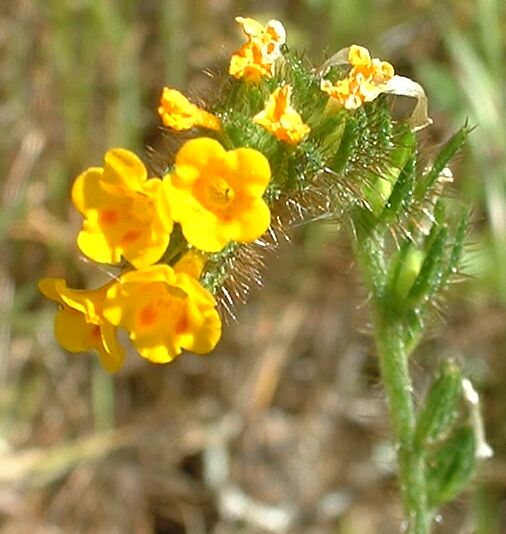- Fiddleneck
image_width = 250px
regnum =Plant ae
divisio = Magnoliophyta
classis =Magnoliopsida
familia =Boraginaceae
genus = "Amsinckia"
subdivision_ranks = Species
subdivision = "Amsinckia carinata "
"Amsinckia douglasiana "
"Amsinckia eastwoodiae "
"Amsinckia grandiflora "
"Amsinckia intermedia "
"Amsinckia lunaris "
"Amsinckia lycopsoides "
"Amsinckia marginata "
"Amsinckia menziesii "
"Amsinckia spectabilis "
"Amsinckia tessellata "
"Amsinckia vernicosa "The fiddlenecks are the
genus "Amsinckia" offlowering plant s in the borage or forget-me-not familyBoraginaceae . They get their name from their flower stems, which bear a large number of small flowers, and curl over at the top in a way that somewhat suggests the head of aviolin .The fiddlenecks are native to western
North America and south-westernSouth America , but they have spread widely to other regions. They areannual plant s, many of them bristly. Most have an erect stem, whose height varies from 20 to 120 cm. In most species the flowers are yellow, often with an orange tinge. Most are found at relatively low altitudes, below 500 metres.The seeds and foliage of fiddlenecks are poisonous to livestock, particularly
cattle , because they containalkaloid s and high concentrations ofnitrate s. The sharp hairs of the plants can cause skin irritation in humans. However, the shoots, seeds or leaves of several species were used as food by Native Americans, and the plant also had some medicinal uses.The species are hard to distinguish, and their ranges overlap; furthermore several of them have large numbers of slightly different varieties, and several of the species hybridise naturally. To decide which species a particular specimen belongs to, therefore, is likely to require a detailed examination with an identification key in hand.
The species in the genus are:
*Malheur Fiddleneck, "Amsinckia carinata ": Rare, endemic toOregon and listed asendangered by the state. Has been considered to be a synonym of "A. varnicosa", but this is implausible given the separation of their ranges.
* Douglas' Fiddleneck, "Amsinckia douglasiana ": Uncommon. South Coast and Western Transverse Ranges of California
*Eastwood's Fiddleneck, "Amsinckia eastwoodiae ": Lower-lying areas of central and southern California, west of the Sierra Nevadas
*Large-flowered Fiddleneck, "Amsinckia grandiflora ": Central Valley of California. Endemic to California and listed asendangered by the state and by the US federal government.
*Bent-flowered Fiddleneck, "Amsinckia lunaris ": Uncommon.San Francisco Bay Area , Inner Coast Ranges and western Central Valley of California. Endemic to California and listed as fairly endangered by the state.
*Tarweed Fiddleneck, "Amsinckia lycopsoides ": Common. Found in all the Pacific coast states of the USA (though not east of the Sierra Nevadas in California), and intoIdaho to the east andBritish Columbia to the north
*Rancher's Fireweed, "Amsinckia menziesii ". Abundant throughout the western states of the USA, in British Columbia and inBaja California , at heights of up to 1700 metres. Also native to South America, and found as an alien species in eastern North America and the Old World. Several varieties recognised.
*Seaside Fiddleneck or Woolly Breeches, "Amsinckia spectabilis ": Found on the Pacific coast of North America from British Columbia to Baja California, and on offshore islands, at heights of up to 300m.
*Devil's Lettuce or Bristly Fiddleneck, "Amsinckia tessellata ": Common. Found at heights up to 2200 metres, in most of California, Arizona, Oregon and Washington; also found in South America. Absent from the Sierra Nevadas and the north coastal regions of California. Several varieties recognised.
*Green Fiddleneck, "Amsinckia vernicosa ": Uncommon. Found at heights of up to 1500 metres, in the south Coast Ranges of California and theMojave Desert .External links
* [http://ucjeps.berkeley.edu/cgi-bin/get_JM_treatment.pl?2030,2031 Jepson Manual treatment of the genus]
* [http://elib.cs.berkeley.edu/cgi/img_query?where-genre=Plant&testing=123&rel-taxon=contains&where-taxon=Amsinckia&rel-namesoup=contains&where-namesoup=&where-lifeform=any&rel-location=like&where-location=&rel-country=eq&where-country=any&rel-state=eq&where-state=any&where-county=any&where-collectn=any&rel-photographer=eq&where-photographer=any&rel-kwid=equals&where-kwid= Pictures of fiddlenecks in the CalPhotos database]
Wikimedia Foundation. 2010.

